Five faculty members were named Josiah Meigs Distinguished Professors for 2020. The professorship is the university’s highest recognition for instruction at the undergraduate and graduate levels. Meigs Professors receive a permanent salary increase of $6,000 and a one-year discretionary fund of $1,000.
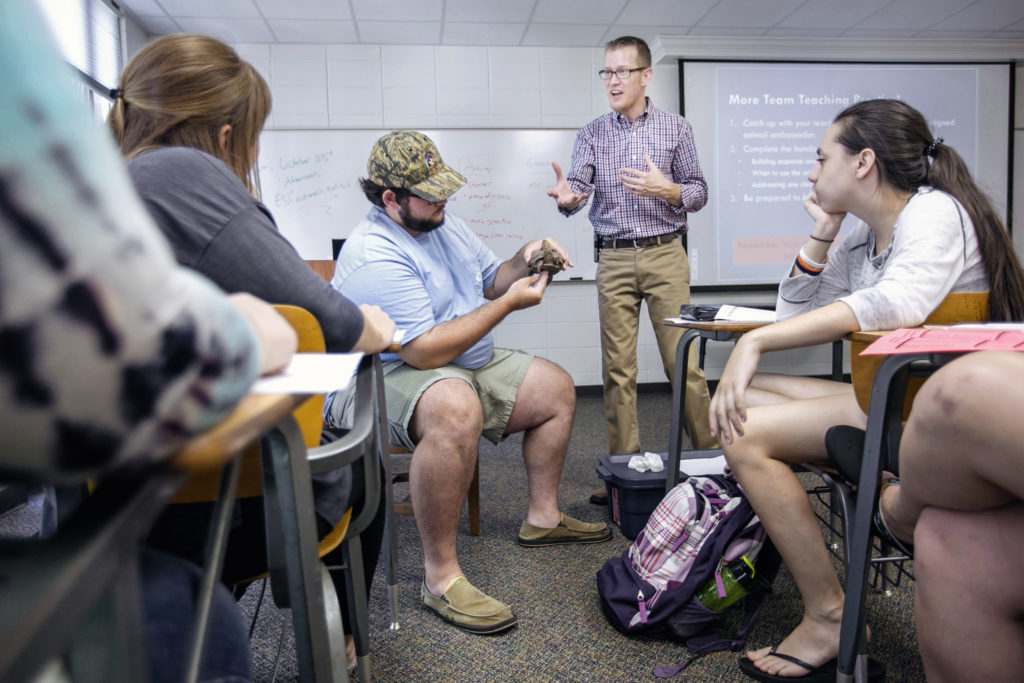
Nick Fuhrman
Professor
Department of Agricultural Leadership, Education and Communication
College of Agricultural and Environmental Sciences
If you walk by one of Nick Fuhrman’s classes, you might see students from the College of Agricultural and Environmental Sciences handling snakes, singing around a fake campfire or showing students from Extra Special People, Inc. how to build a habitat for salamanders. One thing is certain—his students will be engaged and having fun.
Fuhrman was hired in 2008 as an assistant professor and has spent the past decade developing a professional style that sets him apart from his colleagues. His current position as professor of environmental education requires 44% instruction, 25% extension and 20% administrative appointment, but he regularly goes above and beyond the call of duty.
Fuhrman not only teaches a First-Year Odyssey seminar, four undergraduate courses and two graduate courses, but he also gets to know his students personally. He returns assignments with “punny” stamps and motivational notes, and at the end of each semester, Fuhrman takes his encouragement a step further by writing personal notes to each student, detailing their accomplishments and why he’s proud of them. For these reasons, his students have dubbed him an “owl-standing” teacher.
“Nick exemplifies what a teacher should be,” wrote a professor who worked with Fuhrman through the North American Colleges and Teachers for Agriculture association. “He cares about his students deeply. He finds ways to engage each one in their individualized learning journey…he helps students become the best agriculture leaders, teachers and communicators they can be.”
In addition to teaching, Fuhrman has published more than 40 journal articles, most of which focus on outcomes of innovative and experiential-based teaching activities; served as principal investigator, co-PI, collaborator or evaluator on almost $10 million in secured funding; sat on NACTA’s executive board; mentored Lilly Teaching Fellows and ALEC faculty; chaired the ALEC doctoral program committee; and served as major professor for nearly 50 graduate students.
“To speak to all of Dr. Fuhrman’s exemplary characteristics, achievements and teaching successes would be a graduate thesis in itself,” wrote one of his past graduate advisees. “His teaching and mentorship have been so incredibly impactful on my academics and now my career. Dr. Fuhrman guided me through job transitions, provided me with reference materials and supported me in my career long after I left the classroom.”
Fuhrman’s commitment to his work is further exemplified by his numerous awards, including being recognized as a Lilly Teaching Fellow and by the UGA Student Government Association as one of the 10 top UGA teachers campus wide twice in four years.
Furthermore, his accomplishments extend far beyond campus.
When he’s not working at UGA, Fuhrman moonlights as “Ranger Nick” on the Georgia Farm Bureau’s monthly television show, the Farm Monitor. The show, which airs nationally on the RFD-TV network and Georgia Public Broadcasting, allows him to “edu-tain” viewers, often using live animals, about the many interesting sides of agriculture and natural resources. This is a similar concept to one of his undergraduate classes, AGED 2001: Teaching with Animals, which won the D.W. Brooks Diversity Award for its dedication to teaching those with special needs.
—Victoria Vanhuss
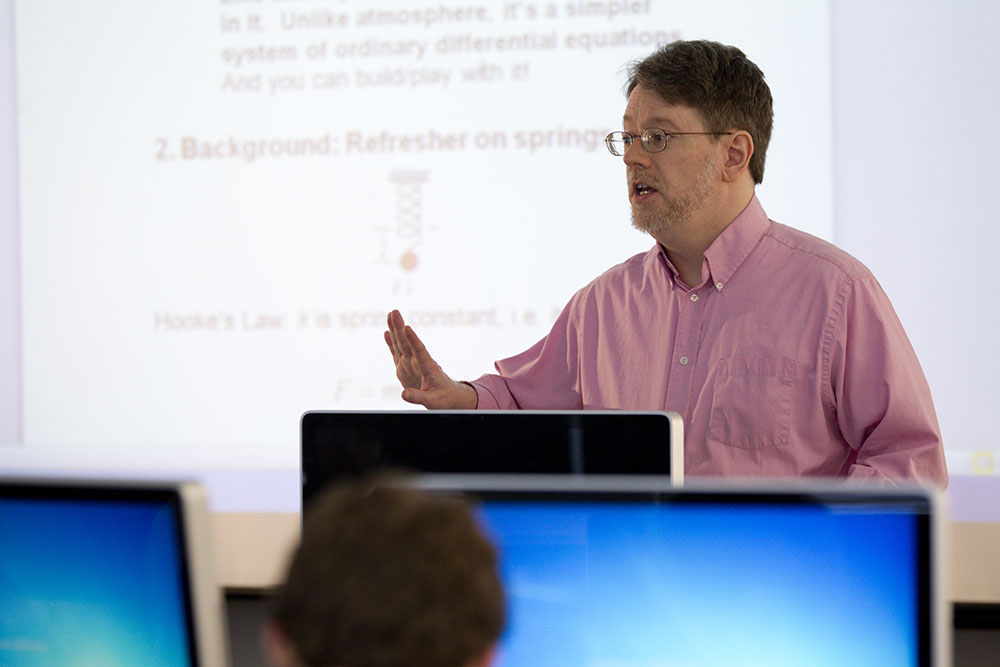
John Knox
Professor
Department of Geography
Franklin College of Arts and Sciences
John Knox excels at stimulating students to wonder and learn.
After eight years as a lecturer and associate research scientist, a tenure-eligible position in 2008, promotions to associate professor in 2011 and professor in 2017, Knox brings a complete understanding of the classroom and the laboratory to his courses. His teaching-intensive faculty role, with a teaching load of six courses per year, including the GRSC 7770 course for teaching assistants on how to teach, brings hundreds of UGA students at every level into his orbit every academic year and more than 6,000 students during his UGA career so far.
“Dr. Knox specifically aspires to improve his already-impressive teaching practice in six focal areas by drawing from state-of-the-art pedagogic literature, self-reflexivity and trial and error, and by seeking critical feedback from peers and students,” wrote one colleague. “He is immensely creative and consistently finds new ways to connect with students, even as their expectations and experience change over time.”
Knox works to continually refine his methods and ensure that he is engaging each student in the best ways possible.
Over the course of his career, Knox has taught more than 120 course sections including “Atmospheric Hazards,” “Atmospheric Thermodynamics” and a “Weather Forecasting Seminar.” However, Knox’s commitment to engaging students extends beyond the traditional classroom. In a recent headline event, “Eclipse Blackout Between the Hedges” held in Sanford Stadium in 2017, Knox conceived of, co-planned and co-hosted with Marshall Shepherd an educational gathering in Sanford Stadium to leverage the 99.1% total eclipse in Athens. The event was one of the largest ever eclipse-related educational events; more than 20,000 people attended in person, and 17,000 K-12 students in 20 area schools participated via a collaboration with UGA College of Education professor Julie Luft.
Through consistent exploration along different avenues of knowledge, modeling and discovery, Knox aspires to make students curious about weather and climate and inspire them to think about broad dynamics and systems affecting the planet.
“Dr. Knox makes his lectures engaging for students who come from a variety of educational backgrounds,” wrote one former student. “He is able to captivate his audience—whether it be a couple-hundred-person introductory class filled with business majors seeking only to fulfill their physical science requirement or a small room of meteorology students eagerly looking to expand their understanding of the atmosphere.”
This description is amplified by the numerous awards Knox has received for teaching over the years, including the CASE/Carnegie Foundation for the Advancement of Teaching Georgia Professor of the Year (2014)—the first UGA professor so honored in a decade and the first atmospheric sciences professor selected from any state in the previous 25 years. In January 2020, he was presented with the national Edward N. Lorenz Teaching Excellence Award by the American Meteorological Society.
In addition to his teaching, Knox is an internationally recognized expert about clear-air turbulence forecasting and was elected a Fellow of the American Meteorological Society in 2020. He was also elected to the Clarke County Board of Education in 2016.
“Beyond metrics, Knox continually employs innovative approaches within his classroom that students talk about years later. He employs science, music, novel group dynamics, movies and in-classroom demonstrations masterfully,” wrote another colleague. “His techniques do not feel contrived or ‘over-the-top’ but rather serve as important techniques for allowing students to grasp concepts or feel engaged. At the national level, Dr. Knox served on a national committee that helped establish the curriculum requirements for meteorology and atmospheric sciences programs.”
—Katie Cowart
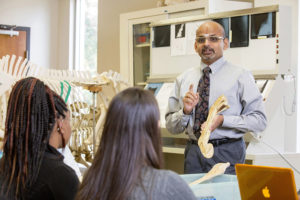
Puliyur S. MohanKumar
Professor
Veterinary Biosciences and Diagnostic Imaging
College of Veterinary Medicine
It’s not unusual for the College of Veterinary Medicine’s Puliyur S. MohanKumar to invite his students over for dinner. He hosts these meals, in part, because research shows that students learn better when they interact with their professors outside of the classroom. But it’s also a chance to build community and morale within his department.
MohanKumar, who is affectionately called “Dr. MK” by his pupils and peers, joined the UGA faculty in July 2015. Since then, he’s carried a 50% instruction appointment.
One of MohanKumar’s most intense courses is the 4.5-credit Carnivore Anatomy (dog and cat) course, which he’s led since his arrival at the veterinary medicine college. He coordinates this course, giving 10 lectures and leading all 44 two-hour laboratory sessions.
He often uses technology to make his courses more effective—his most recent creation being an electronic, interactive canine thoracic limb ibook, which is provided to students free of charge and brings his UGA ibook collection to five.
This kind of innovative, dedicated focus is the reason his students and colleagues view him with such a high level of regard.
“Dr. MK is, and I don’t say this lightly or in any way as a ‘stretch,’ untouchable in terms of caliber of veterinary medical instruction,” wrote one of his colleagues. “…Student evaluation scores for Dr. MK are not only the highest I have personally ever seen from large classes, but they also show the greatest gap I have ever seen between the top departmental score and the next highest faculty member.”
His vision extends beyond his courses. In an effort to better his department, MohanKumar conceived the idea of an online non-thesis master’s degree in comparative biomedical sciences. The program, which launched in January, brings together existing courses for a new purpose.
“Rarely do you meet someone like Mohan, who is ever-positive and energetic, open-minded and so willing to help, devoted to his students and excited, truly excited about their education, invested in the science of teaching and learning, and an engaging, willing and collaborative colleague. If anyone is deserving of a Josiah Meigs Distinguished Professorship, Dr. MohanKumar is that person,” wrote another colleague.
MohanKumar is no stranger to receiving attention for his high-quality work. Since teaching at UGA, he’s been selected by first-year veterinary medicine students as their Teacher of the Year on four different occasions. He was also nominated for the 2017 Zoetis National Teacher of the Year Award. Other honors bestowed upon him include the A.M. Mills Award for Outstanding Contributions to Veterinary Medicine and the David Tyler Award for Advanced in Teaching. The 2010 recipient of the Pfizer Research Excellence Award, MohanKumar has a career research funding history of more than $10.5 million as principal or co-principal investigator.
“Through all his interactions with our classes, Dr. MohanKumar has shown his dedication, character and leadership to advance our education. He has personally ensured that the future veterinarians from the University of Georgia College of Veterinary Medicine will have a solid knowledge of clinical anatomy as well as the confidence needed to do well in all areas of our curriculum and beyond,” wrote a group of three students.
—Victoria Vanhuss
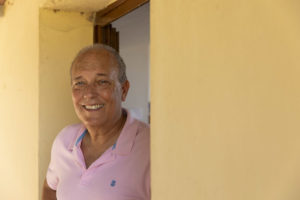
Richard Morrison
Associate Professor
Department of Chemistry
Franklin College of Arts and Sciences
As director of Organic Chemistry Instruction in the Franklin College of Arts and Sciences department of chemistry, Richard Morrison oversees all aspects of undergraduate instruction in organic chemistry and coordinates instruction with his faculty colleagues at the graduate level. Teaching hundreds of students at a time on the front lines of a foundational STEM discipline, Morrison has used creativity and technology to enhance learning and his effectiveness as a mentor.
A large lecture hall and complex subject matter characterized as among the most difficult at the university can present real challenges for the brightest students as well as the most engaged faculty members. Morrison was quick to recognize that classroom response systems, or clickers, could help probe student understanding and misconceptions more effectively in real time, thus transforming the traditional lecture into an interactive, inquiry-based discussion between an experienced “guide” and engaged student participants.
“Dr. Morrison possesses a keen insight into how students learn, and as a result he has been highly successful implementing pedagogical modifications to remediate student difficulties,” wrote one colleague. “His improvements to organic chemistry instruction and pedagogy have substantively enhanced our students’ education and serve as a model for university programs across the country.”
In the spirit of interactive learning, Morrison often clips on a microphone and ventures beyond the lectern to work with his students on problem solving. He has developed novel question formats that reveal the logic pathways students employ in arriving at their solutions, resulting in a personalized lecture style that extends his desire for students to individually and collectively comprehend and internalize the material he presents.
His groundbreaking repurposing of classroom response systems, from multiple choice or matching questions into interactive tools that reveal student problem-solving strategies, was deemed such a revolutionary change that his questions were made available to the chemical education community for general use by the Journal of Chemical Education. Morrison’s educational research in this area was reported in the Journal, and he was invited to organize a symposium for the 237th national meeting of the American Chemical Society to share his innovative and transformative pedagogies for large-lecture instruction.
“Dr. Morrison displays immense intelligence and imparts that intelligence in a straightforward and interesting way,” wrote one former student. “Teaching one of the most feared classes at UGA, he puts students at ease from the first day by helping us realize that we have the ability to succeed. He holds his students to a higher standard than most think they are capable of achieving, and then he does everything in his power to ensure that the high standard is reached.”
A strong proponent of research experiences for undergraduate students, Morrison conceptualized and inaugurated the Summer Undergraduate Research Opportunities, or SURO, program at UGA in 2001. The program recruits students locally, nationally and internationally to come to campus for eight weeks of research experience. The program has brought many graduate students to UGA.
“Dr. Morrison’s personal investment in each and every student he serves is truly astounding,” wrote one student who earned a Ph.D. under Morrison in 2019 and is now a faculty member at Rice University. “I was given training as both an organic chemist and as a chemical educator. This practical experience provided a wonderful foundation for my continued success.”
—Alan Flurry
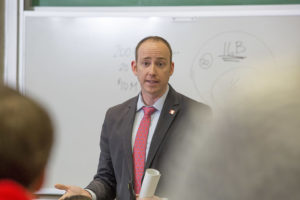
Andrew Owsiak
Associate Professor
Department of International Affairs
School of Public and International Affairs
Described as “passionate,” “enthusiastic,” “innovative” and “impressive”—and identifiable on campus by his iconic red shoes—Andrew Owsiak, a faculty member in the School of Public and International Affairs, is beloved by his students and colleagues alike.
His department and school recognize his strong campus-wide effect on the university’s teaching mission and his students’ adoration for him despite both his 8 a.m. classes and challenging course material.
“I will add the greatest compliment an instructor can receive: students find Dr. Owsiak demanding and challenging, yet also supportive and rewarding. He never loses sight of the students,” wrote one colleague. “His student legion therefore results not from him creating an easy path for students, but rather from being ‘funny,’ ‘interesting,’ ‘engaging,’ ‘approachable,’ ‘supportive’ and asking students to rise to their potential. This philosophy then permeates his mentorship of students and faculty, so a new generation of instructors does the same.” Indeed, Owsiak mentors a number of early career faculty as a co-facilitator of and mentor within the Teaching Academy Fellows Program.
Owsiak’s classroom instruction touches the School of Public and International Affairs’ entire curriculum—from a First-Year Odyssey seminar to introductory undergraduate courses to upper-level undergraduate courses. He also oversees numerous experiential learning opportunities such as internships and research through the Center for Undergraduate Research Opportunities. On top of this, he teaches introductory and upper-level graduate seminars, and supervises doctoral dissertations.
Using computer-based and in-person role playing simulations to enhance learning and encourage students to develop interdisciplinary, critical-thinking skills, Owsiak draws in students from a variety of other disciplines. His First-Year Odyssey seminar, for example, places students as actors within the French Revolution (part of the Reacting to the Past pedagogy). Similarly, he is currently creating a free classroom game that places students inside of former President Barack Obama’s National Security Council. The game asks students to design strategy, develop policy and work through real-life situations related to cyber threats.
For Owsiak’s various efforts, he has been invited into the UGA Teaching Academy, been named a Student Veterans Resource Center Distinguished Faculty Fellow and received the Richard B. Russell Award for Excellence in Undergraduate Teaching, the SPIA Excellence in Teaching Award, the First-Year Odyssey Seminar Program Teaching Award, the CURO Mentoring Award and the SPIA Student Union Teacher Award.
“Dr. Owsiak has contributed to [the] long-term professional development of more student veterans than any other UGA faculty member bar none,” wrote a colleague with the Student Veterans Resource Center. “And without looking far, we hear that he ‘changed [students’] professional trajectory,’ became students’ confidante and advocate, and prepared students for their chosen career—whatever that was. Along the way, he gives them marketable skills like writing and argumentation and helps them find their way. Importantly, this relationship lasts well into students’ post-graduate careers.”
Other colleagues feel the same way.
“Simply put, Andy improves everything he touches, and the entire UGA community is better as a result. I can think of no more deserving contribution than this that is worthy of recognition and a Meigs Professorship,” wrote another department of international affairs faculty member.
—Victoria Vanhuss


